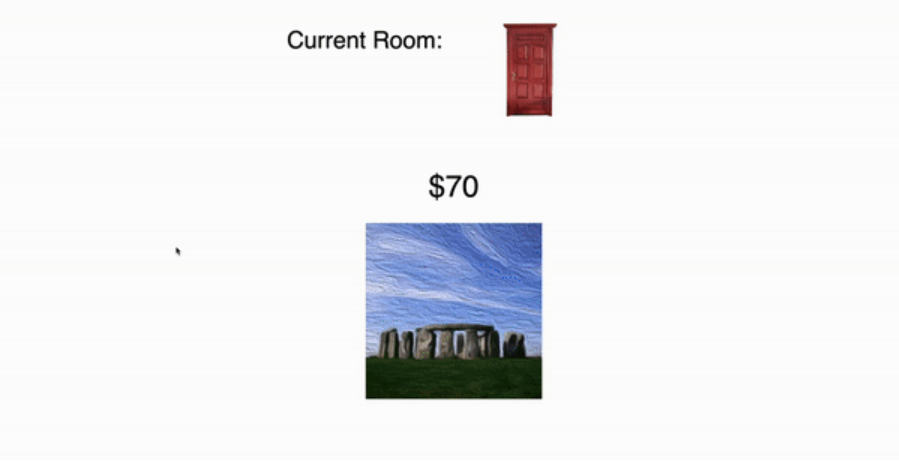DURHAM, N.C. – Shifting from a high-pressure mindset to a curious one improves people’s memory.

Credit: Alyssa Sinclair – Duke Institute for Brain Sciences
DURHAM, N.C. – Shifting from a high-pressure mindset to a curious one improves people’s memory.
New research from Duke found that people who imagined being a thief scouting a virtual art museum in preparation for a heist were better at remembering the paintings they saw, compared to people who played the same computer game while imagining that they were executing the heist in-the-moment.
These subtle differences in motivation — urgent, immediate goal-seeking versus curious exploration for a future goal — have big potential for framing real-world challenges such as encouraging people to get a vaccine, prompting climate change action, and even treating psychiatric disorders.
The findings appeared online July 25 in the Proceedings of the National Academy of Sciences.
Alyssa Sinclair, Ph.D. ’23, a postdoctoral researcher working in the lab of Duke Institute for Brain Sciences director Alison Adcock, Ph.D., M.D., recruited 420 adults to pretend to be art thieves for a day. The participants were then randomly assigned to one of two groups and received different backstories.
“For the urgent group, we told them, ‘You’re a master thief, you’re doing the heist right now. Steal as much as you can!’,” Sinclair said. “Whereas for the curious group, we told them they were a thief who’s scouting the museum to plan a future heist.”
After getting these different backstories, however, participants in the two groups played the exact same computer game, scored the exact same way. They explored an art museum with four colored doors, representing different rooms, and clicked on a door to reveal a painting from the room and its value. Some rooms held more valuable collections of art. No matter which scenario they were pretending to be in, everyone earned real bonus money by finding more valuable paintings.
The impact of this difference in mindset was most apparent the following day. When participants logged back in, they were met with a pop quiz about whether they could recognize 175 different paintings (100 from the day before, and 75 new ones). If participants flagged a painting as familiar, they also had to recall how much it was worth.
Sinclair and her co-author, fellow Duke psychology & neuroscience graduate student Candice Yuxi Wang, were gratified after they graded the tests to see their predictions had played out.
“The curious group participants who imagined planning a heist had better memory the next day,” Sinclair said. “They correctly recognized more paintings. They remembered how much each painting was worth. And reward boosted memory, so valuable paintings were more likely to be remembered. But we didn’t see that in the urgent group participants who imagined executing the heist.”
Urgent group participants, however, had a different advantage. They were better at figuring out which doors hid more expensive pieces, and as a result snagged more high value paintings. Their stash was appraised at about $230 more than the curious participants’ collection.
The difference in strategies (curious versus urgent) and their outcomes (better memory versus higher-valued paintings) doesn’t mean one is better than the other, though.
“It’s valuable to learn which mode is adaptive in a given moment and use it strategically,” Dr. Adcock said.
For example, being in an urgent, high-pressure mode might be the best option for a short-term problem.
“If you’re on a hike and there’s a bear, you don’t want to be thinking about long-term planning,” Sinclair said. “You need to focus on getting out of there right now.”
Opting for an urgent mindset might also be useful in less grisly scenarios that require short-term focus, Sinclair explained, like prompting people to get a covid vaccine.
For encouraging long-term memory or action, stressing people out is less effective.
“Sometimes you want to motivate people to seek information and remember it in the future, which might have longer term consequences for lifestyle changes,” Sinclair said. “Maybe for that, you need to put them in a curious mode so that they can actually retain that information.”
Sinclair and Wang are now following up on these findings to see how urgency and curiosity activate different parts of the brain. Early evidence suggests that, by engaging the amygdala, an almond-shaped brain region best known for its role in fear memory, “urgent mode” helps form focused, efficient memories. Curious exploration, however, seems to shuttle the learning-enhancing neurochemical dopamine to the hippocampus, a brain region crucial for forming detailed long-term memories.
With these brain results in mind, Dr. Adcock is exploring how her lab’s research might also benefit the patients she sees as a psychiatrist.
“Most of adult psychotherapy is about how we encourage flexibility, like with curious mode” Dr. Adcock said. “But it’s much harder for people to do since we spend a lot of our adult lives in an urgency mode.”
These thought exercises may give people the ability to manipulate their own neurochemical spigots and develop “psychological maneuvers,” or cues that act similar to pharmaceuticals, Dr. Adcock explained.
“For me, the ultimate goal would be to teach people to do this for themselves,” Dr. Adcock said. “That’s empowering.”
Support for the research came from a Duke Health Scholars Award from Duke University.
CITATION: “Instructed Motivational States Bias Reinforcement Learning and Memory Formation,” Alyssa H. Sinclair, Yuxi C. Wang, R. Alison Adcock. Proceedings of the National Academy of Sciences, July 25 2023. DOI: 10.1073/pnas.2304881120
Journal
Proceedings of the National Academy of Sciences
DOI
10.1073/pnas.2304881120
Method of Research
Experimental study
Subject of Research
People
Article Title
Instructed Motivational States Bias Reinforcement Learning and Memory Formation
Article Publication Date
25-Jul-2023





